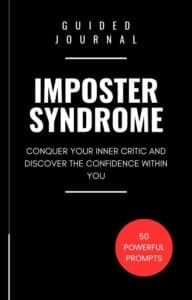Imposter syndrome is a common and often overwhelming feeling where individuals doubt their abilities and feel like a fraud, despite evident success. It affects people across various fields, from students to professionals, causing them to believe they don’t deserve their accomplishments. This pervasive self-doubt can hinder personal and professional growth, leading to stress and anxiety.
Recognizing and addressing imposter syndrome is crucial for building confidence and self-belief. One effective way to combat these feelings is through journaling. Writing allows you to explore your thoughts and emotions, gain perspective, and develop a healthier mindset. These prompts are designed to help you navigate and overcome imposter syndrome through a series of thought-provoking prompts. These prompts are categorized into different themes, such as self-reflection, cognitive restructuring, self-compassion, gratitude, goal setting, reflecting on feedback, and visualizing success.
Each prompt is crafted to encourage introspection and provide a structured way to challenge negative thoughts. By regularly engaging with these prompts, you will learn to recognize your achievements, embrace your strengths, and develop a more positive self-image. Whether you’re just starting your journey or looking for ongoing support, these guided journal prompts are a valuable tool in your self-improvement arsenal.
Understanding Imposter Syndrome
What is Imposter Syndrome?
Imposter syndrome is a psychological pattern where individuals doubt their accomplishments and have a persistent fear of being exposed as a “fraud.” Despite evidence of their competence, people with imposter syndrome believe they don’t deserve their success. This feeling can affect anyone, regardless of their level of achievement or expertise, and can lead to significant stress and anxiety.
How Does Imposter Syndrome Manifest?
Imposter syndrome can manifest in various ways, often depending on the individual’s personality and experiences. Here are some common signs:
- Self-Doubt: Constantly questioning your abilities and feeling like you don’t measure up to others.
- Perfectionism: Setting excessively high standards for yourself and feeling disappointed when you don’t meet them.
- Fear of Failure: Avoiding new challenges or opportunities because you’re afraid of failing and being exposed as incompetent.
- Overworking: Putting in extra hours and effort to ensure that no one discovers you are a “fraud.”
- Downplaying Achievements: Dismissing your accomplishments as luck or timing rather than attributing them to your skills and hard work.
Relatable Examples of Imposter Syndrome
To better understand imposter syndrome, let’s look at some relatable examples:
Example 1: The Successful Professional
Imagine a successful professional named Sarah. She has received numerous awards and recognitions in her field, yet she constantly feels like she doesn’t deserve them. Sarah believes her success is due to luck and fears that one day her colleagues will realize she’s not as competent as they think. Despite her achievements, Sarah feels anxious and unworthy, leading her to overwork and stress about every minor detail.
Example 2: The High-Achieving Student
John is a top student in his university, consistently earning high grades and praise from his professors. However, he often attributes his success to external factors, such as easy exams or lenient grading. John worries that he won’t be able to maintain his performance and that others will soon see he isn’t as intelligent as they believe. This fear drives him to study excessively and avoid participating in activities where he might be judged.
Causes of Imposter Syndrome
Several factors can contribute to the development of imposter syndrome:
- Family Expectations: Growing up in a family with high expectations can lead to feelings of inadequacy when those expectations are not met.
- Perfectionist Tendencies: Individuals with perfectionist tendencies often set unrealistically high standards for themselves, making it difficult to feel satisfied with their achievements.
- New Environments: Starting a new job, school, or entering a new social group can trigger imposter syndrome as individuals adjust to new expectations and challenges.
- Cultural Pressures: Societal norms and cultural pressures to succeed can contribute to feelings of inadequacy and self-doubt.
Overcoming Imposter Syndrome
While imposter syndrome can be challenging, there are strategies to help manage and overcome these feelings:
- Acknowledge Your Feelings: Recognize that imposter syndrome is a common experience and that feeling this way doesn’t mean you are a fraud.
- Celebrate Achievements: Keep a record of your accomplishments and take time to celebrate your successes, no matter how small.
- Challenge Negative Thoughts: When self-doubt creeps in, challenge those thoughts by considering the evidence that contradicts them.
- Seek Support: Talk to trusted friends, mentors, or a therapist about your feelings. They can provide valuable perspective and support.
- Set Realistic Goals: Break tasks into smaller, manageable steps and set realistic goals to avoid the pressure of perfectionism.
Imposter syndrome is a widespread phenomenon that affects many people across different walks of life. By understanding its manifestations and causes, you can begin to recognize these feelings in yourself and take steps to address them. Remember, your achievements are a result of your hard work, skills, and dedication. Embrace your successes, challenge negative thoughts, and seek support when needed. Overcoming imposter syndrome is a journey, but with the right tools and mindset, you can build confidence and self-belief, allowing you to thrive personally and professionally.

The Power of Journaling for Overcoming Imposter Syndrome
What is Journaling?
Journaling is the practice of regularly writing down your thoughts, feelings, and experiences in a structured way. It can be done in a physical notebook or digitally, and it serves as a personal space for self-expression and reflection. By putting your thoughts into words, you can better understand your emotions, track your progress, and gain clarity on various aspects of your life.
How Journaling Helps Overcome Imposter Syndrome
Imposter syndrome can make you feel like a fraud, even when you are successful and capable. Journaling is a powerful tool that can help you manage and overcome these feelings by providing a space to reflect, challenge negative thoughts, and build confidence. Here are some specific ways journaling can help you overcome imposter syndrome:
- Self-Reflection and Awareness
Journaling encourages you to reflect on your experiences and emotions. By regularly writing about situations where you felt like an imposter, you can identify patterns and triggers. This increased self-awareness is the first step in addressing and overcoming imposter syndrome.
Example Prompt: “Describe a recent situation where you felt like an imposter. What specific thoughts and emotions did you experience?”
- Challenging Negative Thoughts
When you write down your thoughts, you can examine them more objectively. This process allows you to challenge negative beliefs and replace them with more realistic and positive ones. Journaling helps you separate fact from fiction and recognize that your feelings of inadequacy are often unfounded.
Example Prompt: “Think of a recent time you felt like a fraud. Write down the evidence that supports this feeling. Now, write down the evidence that contradicts it.”
- Celebrating Achievements
Journaling gives you a chance to document and celebrate your achievements. By keeping a record of your successes, you can see tangible evidence of your capabilities and hard work. Reflecting on your accomplishments can boost your confidence and counteract feelings of being an imposter.
Example Prompt: “List three accomplishments you are proud of. How did you achieve them? What qualities or skills did you use?”
- Practicing Self-Compassion
Writing about your experiences with self-compassion can help you be kinder to yourself. Instead of harshly criticizing yourself for mistakes, journaling allows you to approach these situations with understanding and forgiveness. This practice can reduce the pressure of perfectionism and improve your overall well-being.
Example Prompt: “Think about a mistake you made recently. How can you forgive yourself for it and what can you learn from it?”
- Setting Realistic Goals
Journaling helps you set realistic goals and track your progress. By breaking down your goals into manageable steps, you can reduce the overwhelming pressure that often accompanies imposter syndrome. Tracking your progress in your journal provides a sense of accomplishment and helps you stay motivated.
Example Prompt: “Set a small, achievable goal for the next week. What steps will you take to accomplish it?”
- Building a Positive Mindset
Regularly engaging in positive affirmations and gratitude journaling can shift your mindset from self-doubt to self-belief. Writing about what you are grateful for and affirming your strengths can help you focus on the positive aspects of yourself and your life.
Example Prompt: “List five positive affirmations about yourself and your abilities. How can you remind yourself of these daily?”
Getting Started with Journaling
Starting a journaling practice is simple and doesn’t require much time. Here are some tips to help you get started:
- Choose Your Medium: Decide whether you prefer a physical notebook or a digital journaling app.
- Set a Regular Time: Dedicate a specific time each day or week for journaling to build consistency.
- Find a Quiet Space: Choose a comfortable and quiet space where you can write without distractions.
- Start with Prompts: Use guided prompts to help you focus and get your thoughts flowing.
- Be Honest and Open: Write freely and honestly without worrying about grammar or spelling. This is your personal space for self-expression.
Journaling is a powerful and transformative tool for overcoming imposter syndrome. By reflecting on your experiences, challenging negative thoughts, celebrating achievements, practicing self-compassion, setting realistic goals, and building a positive mindset, you can reduce feelings of self-doubt and embrace your true capabilities. Start your journaling practice today and take the first step towards a more confident and self-assured you.

Journal Writing Prompts for Imposter Syndrome
Download Printable Journal Prompts (PDF) >>
- Describe a recent situation where you felt like an imposter. What specific thoughts and emotions did you experience?
- List three accomplishments you are proud of. How did you achieve them? What qualities or skills did you use?
- Write about a challenge you faced and overcame. How did you handle it, and what did you learn about yourself?
- Think of a recent time you felt like a fraud. Write down the evidence that supports this feeling. Now, write down the evidence that contradicts it.
- List five positive affirmations about yourself and your abilities. How can you remind yourself of these daily?
- Choose a negative thought you often have about yourself. Write it down, then rewrite it in a more positive, realistic way.
- Write a letter to yourself from the perspective of a kind and understanding friend. What would they say to support and encourage you?
- Think about a mistake you made recently. How can you forgive yourself for it and what can you learn from it?
- Create a self-care plan that includes activities that make you feel good and help you relax. How can you incorporate these into your daily routine?
- Write down three things you are grateful for today. How do these things positively impact your life?
- Who are the people in your life that support and believe in you? How can you reach out to them more often?
- What are three small wins you had today? How did they make you feel?
- Set a small, achievable goal for the next week. What steps will you take to accomplish it?
- Describe your long-term career or personal goals. How do your skills and experiences so far contribute to these goals?
- Reflect on the progress you’ve made towards a goal you’re working on. What steps have you taken, and what will you do next?
- Recall a time when you received positive feedback. What was said, and how did it make you feel?
- Write about a recent project or task you completed. What went well because of your efforts?
- Think about a piece of constructive criticism you received. How can you use this feedback to improve without letting it affect your self-worth?
- Close your eyes and imagine yourself succeeding in a situation where you typically feel like an imposter. Describe this scene in detail.
- Write a letter from your future self who has achieved what you aspire to. What advice and encouragement do they offer you now?
- Think about a future event that you are nervous about. Visualize a positive outcome and describe the steps you took to achieve it.
- Describe a time when you felt genuinely confident. What were the circumstances, and what contributed to this feeling?
- Write about someone you admire. What qualities do they have that you also see in yourself?
- Think of a time when you helped someone else. How did it make you feel, and what does it say about your character?
- List three skills you have improved over the past year. How did you improve them?
- Reflect on a recent compliment you received. Why do you think the person gave you that compliment?
- Describe a situation where you felt out of your depth but managed to succeed. What did you learn from this experience?
- Think about a time when you compared yourself to others. What can you do to focus more on your own unique path?
- List three qualities you admire in yourself. How do these qualities benefit you in your daily life?
- Write about a time when you doubted yourself but received validation from others. How did this change your perspective?
- Describe a situation where you took a risk and it paid off. What gave you the courage to take that risk?
- Think about a time when you felt truly happy and content. What were you doing, and who were you with?
- List three things you love about your work or hobbies. How do these things reflect your strengths and passions?
- Reflect on a time when you learned something new. How did this experience challenge and benefit you?
- Write about a mentor or role model who has influenced you. What lessons have you learned from them?
- Describe a project or task you are currently working on. What are you doing well, and what could you improve?
- Think about a time when you felt proud of yourself. What was the situation, and why did it make you feel proud?
- List three ways you can practice self-compassion. How will these practices help you combat imposter syndrome?
- Write about a fear you have and how you can face it with courage and resilience.
- Describe a situation where you supported someone else through their self-doubt. How did it make you feel, and what did you learn from it?
- Think about a time when you received praise for your work. How did it feel, and what did you do to earn it?
- Write about a moment when you felt a strong sense of belonging. What contributed to this feeling?
- List three goals you have achieved in the past year. How did you accomplish them, and what did you learn from the process?
- Reflect on a time when you felt appreciated by others. What actions or qualities led to this appreciation?
- Describe a challenge you are currently facing. What strengths and resources do you have to help you overcome it?
- Think about a time when you surprised yourself with your abilities. What was the situation, and how did you react?
- List three positive outcomes that have come from experiences where you initially felt like an imposter.
- Write about a time when you felt in control and capable. What were you doing, and what contributed to this feeling?
- Reflect on how far you have come in your personal or professional journey. What milestones are you proud of?
- Create a mantra or phrase that you can repeat to yourself when you feel self-doubt creeping in. How will this help you?
These prompts are designed to guide you through understanding, challenging, and ultimately overcoming imposter syndrome, fostering a stronger sense of self-belief and confidence.
Guided Journal for Imposter Syndrome
50 Writing Prompts to Conquer Your Inner Critic and Discover the Confidence Within You

Are you constantly battling feelings of self-doubt and unworthiness, despite your achievements? Do you often feel like a fraud, fearing that others will eventually see through your perceived inadequacies? You are not alone. Many high-achieving individuals experience imposter syndrome, a phenomenon where success feels undeserved and personal abilities are doubted.
Introducing the Guided Journal for Imposter Syndrome, a transformative tool designed to help you overcome these negative thoughts, embrace your strengths, and build unshakeable self-confidence. Through carefully crafted prompts, this journal will guide you on a journey of self-discovery, reflection, and personal growth.
Key Benefits of the Guided Journal
1. Deep Self-Reflection
This journal provides a safe space for you to explore your thoughts and emotions. With prompts like, “Describe a recent situation where you felt like an imposter. What specific thoughts and emotions did you experience?” you’ll gain insight into the triggers and patterns of your imposter feelings. By understanding these underlying causes, you can start to address and overcome them.
2. Celebrate Your Accomplishments
Often, imposter syndrome makes it hard to acknowledge your successes. This journal encourages you to recognize and celebrate your achievements. Prompts such as, “List three accomplishments you are proud of. How did you achieve them? What qualities or skills did you use?” help you see your true capabilities and build a positive self-image.
3. Challenge Negative Thoughts
One of the core strategies in combating imposter syndrome is to challenge and reframe negative thoughts. Prompts like, “Think of a recent time you felt like a fraud. Write down the evidence that supports this feeling. Now, write down the evidence that contradicts it,” guide you in shifting your perspective and reinforcing a more balanced view of your abilities.
4. Cultivate Self-Compassion
Learning to be kind to yourself is crucial in overcoming self-doubt. This journal includes prompts such as, “Write a letter to yourself from the perspective of a kind and understanding friend. What would they say to support and encourage you?” which help you practice self-compassion and reduce the pressure of perfectionism.
5. Develop a Positive Mindset
Regularly engaging in positive affirmations and gratitude can transform your mindset. Prompts like, “List five positive affirmations about yourself and your abilities. How can you remind yourself of these daily?” encourage you to focus on your strengths and the positive aspects of your life, fostering a healthier self-image.
Structured for Success
The Guided Journal for Imposter Syndrome is thoughtfully organized with 50 detailed prompts, each designed to address different aspects of imposter syndrome. Here’s a glimpse of what’s inside:
- Self-Reflection and Awareness: Gain clarity on your imposter feelings and their triggers.
- Challenging Negative Thoughts: Learn to reframe your negative self-talk.
- Celebrating Achievements: Acknowledge and take pride in your successes.
- Practicing Self-Compassion: Be kinder to yourself and reduce self-criticism.
- Setting Realistic Goals: Break tasks into manageable steps to reduce overwhelm.
- Building a Positive Mindset: Engage in affirmations and gratitude to shift your focus.
Overcoming imposter syndrome is not an overnight process; it requires consistent effort and self-reflection. This guided journal provides a structured pathway to help you confront and dispel feelings of self-doubt. Through these 50 carefully curated prompts, you can gain a deeper understanding of your thoughts and emotions, challenge negative beliefs, and build a stronger foundation of self-confidence.
Remember, it’s essential to be patient and compassionate with yourself as you work through these exercises. Celebrate your progress, no matter how small, and recognize that everyone experiences self-doubt at times. By committing to regular journaling, you are taking a proactive step towards nurturing your mental well-being and personal growth.
The journey to overcoming imposter syndrome is unique for everyone, but the key is to stay persistent and open-minded. Use these journal prompts as a safe space to express yourself, explore your achievements, and reinforce your self-worth. Over time, you will find that the once overwhelming feelings of inadequacy diminish, making way for a more confident and self-assured version of yourself. Keep writing, keep reflecting, and most importantly, keep believing in your capabilities.

